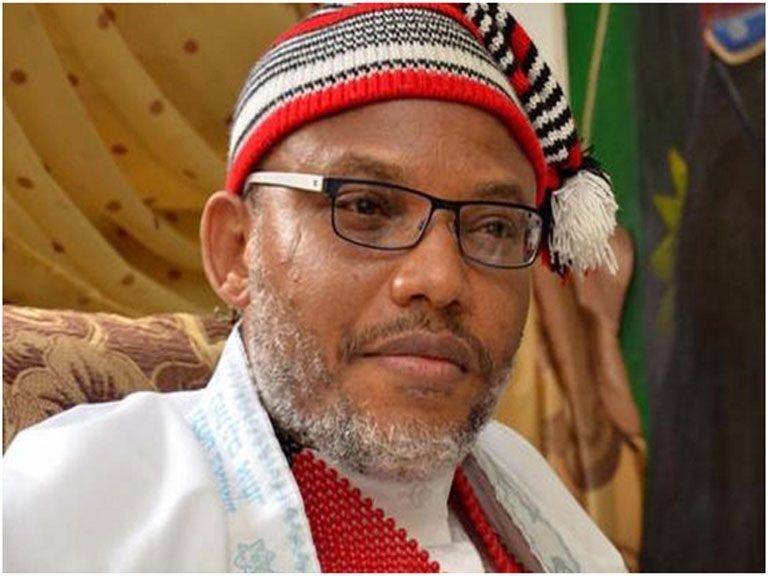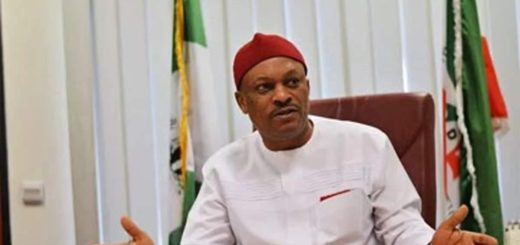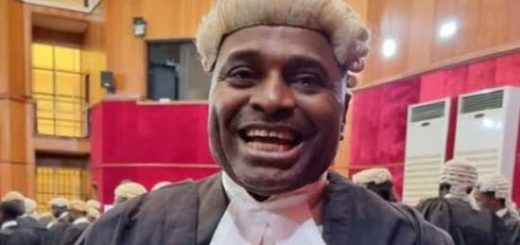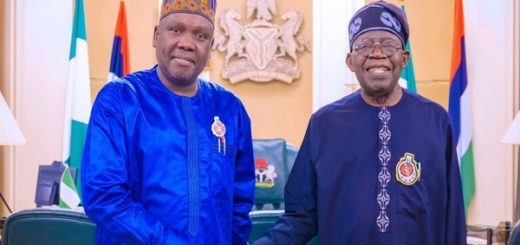“I’m a Human Rights Activist,” Kanu Declares as He Takes the Stand
 In a dramatic twist during Monday’s court session, Nnamdi Kanu, the leader of the Indigenous People of Biafra (IPOB), shocked everyone by dismissing his legal team and opting to represent himself. Kanu, who stands trial on terrorism charges, expressed his deep frustration with the Nigerian justice system, accusing it of unfair treatment and bias.
In a dramatic twist during Monday’s court session, Nnamdi Kanu, the leader of the Indigenous People of Biafra (IPOB), shocked everyone by dismissing his legal team and opting to represent himself. Kanu, who stands trial on terrorism charges, expressed his deep frustration with the Nigerian justice system, accusing it of unfair treatment and bias.
The hearing, held at the Federal High Court in Abuja, saw Kanu take the unprecedented step of telling his lawyers to step aside. Maxwell Opara, one of Kanu’s former lawyers, explained that Kanu felt Nigeria had never addressed his calls for self-determination. He emphasized that Kanu sees himself as a human rights activist fighting for the Igbo people’s right to self-determination, and he was angry that the government had not recognized the legitimate reasons behind his agitation.
“He feels that Nigeria is not fair to him,” Opara shared. “He’s just an activist agitating for self-determination. The government should have addressed the issues that sparked this movement.”
Kanu also drew comparisons to other prominent figures, such as Ibraheem El-Zakzaky, whose case was resolved politically, questioning why his own case had not been treated in the same way. He insinuated that his detention was politically motivated.
As tensions rose in the courtroom, Kanu, visibly agitated, used harsh language, which his lawyers tried to de-escalate. Ultimately, Kanu demanded that his lawyers leave, signaling his intent to represent himself despite lacking legal training. “I no longer want you to represent me,” Kanu told his legal team.
The session ended abruptly, with Justice Binta Nyako adjourning the case indefinitely. Opara, speaking to the press, noted that the adjournment was meaningless, as Justice Nyako had already recused herself from the case in September 2024. According to Opara, the court had no jurisdiction to hear the case, pointing to an outstanding ruling that had removed Justice Nyako from the matter.
“The court is recused,” Opara asserted. “We’re not afraid of trial, but we’re afraid of injustice. Any attempt to bring this case back before Justice Nyako would be unconstitutional.”
Opara also reiterated calls for the Nigerian government to resolve Kanu’s case through political means, similar to other high-profile cases, which many Nigerians believed would help ease tensions in the Southeast region.
Meanwhile, during the session, Kanu accused Justice Binta Nyako of bias, suggesting that her involvement in his case was motivated by personal interests. In a controversial statement, Kanu claimed that Nyako’s family members were facing corruption charges, and he suggested that her continued role in his trial was linked to attempts to influence the resolution of those charges.
Kanu’s accusations were unsubstantiated, but they echoed previous claims that he had been denied a fair trial. He stated that he had been insisting on Nyako’s recusal due to her alleged bias, further arguing that a Supreme Court ruling had already deemed her unfit to preside over his case.
“It’s a breach of judicial oath,” Kanu argued. “The Supreme Court said she’s biased. Why, then, are they insisting on trying me?”
At the heart of Kanu’s frustrations lies his belief that the Nigerian government has consistently ignored his legitimate demands for the independence of Biafra, a cause he has championed since his first arrest in 2015. Although Kanu’s case has seen multiple legal twists and turns, including the striking down of terrorism charges by the Court of Appeal in 2022, his continued detention reflects ongoing political and legal battles.
Despite his legal challenges, Kanu remains resolute, declaring that he is agitating for Biafra’s independence because it is his right. For now, his case remains in limbo, as the courtroom drama continues to unfold.













